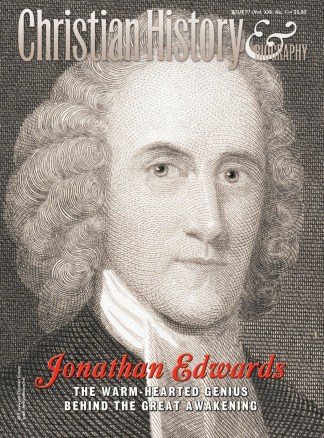Edwards first encountered God in an intensely experiential way while reading 1 Timothy 1:17: “Now unto the King eternal, immortal, invisible, the only wise God, be honor and glory for ever and ever.” He was overcome with “a sense of the glory of the Divine Being; a new sense, quite different from anything I ever experienced before.”
The only language that seemed adequate, as he later recorded in his Personal Narrative (c. 1739), was that of ecstasy: “I thought with myself, how happy I should be, if I might enjoy that God, and be wrapped up to God in heaven, and be as it were swallowed up in him.” Deeply moved, Edwards retreated to “a solitary place” outdoors where, under a broad sky, he was again transfixed by “a sweet sense of the glorious majesty and grace of God, that I know not how to express.”
The Narrative is suffused with the same vividly empirical vocabulary of sense experience that marks his published works on revival.
Edwards wrote it out of a keen, Enlightenment-influenced interest in the psychology of the self. He included not only himself but also his wife, Sarah—always his paragon of true piety. He treated their experiences as models of the way God transforms the Christian’s soul: not simply by providing new knowledge, but also by infusing a “new spiritual sense,” enthralling the heart and mind. After conversion, what was most real to the self was spiritual reality, created and sustained by God.
Edwards met this new reality most powerfully in Scripture, where he gained his new perception of divine things—especially the beauty (or “excellency”) of God.
“I seemed often to see so much light, exhibited by every sentence, and such a refreshing ravishing food communicated,” wrote Edwards, “that I could not get along in reading.” So he often lingered “long on one sentence, to see the wonders contained in it; and yet almost every sentence seemed to be full of wonders.”
Edwards’s Narrative follows the pattern of the classic Puritan conversion narrative. It moves from despair and humiliation to exaltation and a state of grace. As he made clear in other writings, however, Edwards rejected the Puritan notion that conversion would always follow a predictable pattern. God’s sovereign and saving ways, believed Edwards, could not be so confidently calculated. God’s was, as Edwards later said of the Northampton revivals, a “surprising work.”
Copyright © 2003 by the author or Christianity Today/Christian History magazine. Click here for reprint information on Christian History.










